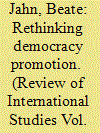|
|
|
Sort Order |
|
|
|
Items / Page
|
|
|
|
|
|
|
| Srl | Item |
| 1 |
ID:
110202


|
|
|
|
|
| Publication |
2012.
|
| Summary/Abstract |
Why has the term humanitarian intervention experienced such a meteoric rise into the core of academic as well as public political discourse? An investigation of classical theory shows that the use of force to help citizens of other states has been regularly contemplated and practiced in the past. The concept of humanitarian intervention therefore does not describe new policies; instead it serves to hide the political nature of these policies today and functions as a 'doctrinal advance guard' for a new international order. It is the political conjuncture that requires a new name for old policies and its radical political content that explains the timing, speed and impact of this term.
|
|
|
|
|
|
|
|
|
|
|
|
|
|
|
|
| 2 |
ID:
060951


|
|
|
| 3 |
ID:
159466


|
|
|
|
|
| Summary/Abstract |
Liberal internationalism has been in crisis for a while now. Yet, until recently, its supporters have argued that its prospects are better than ever, as the successful spread of liberal principles, practices and institutions in the international sphere provides the necessary basis for reform. Alas, recent political developments do not support these expectations. In fact, the Brexit vote, the election of President Trump, and the rise of populism more generally challenge liberalism in the domestic sphere and aim to unravel its international achievements. But the idea that these movements are therefore liberalism's nemeses does not quite follow. Providing a theoretical and historical analysis of liberalism, this article shows that the separation of domestic and international politics is constitutive of liberalism itself. The successful extension of liberal principles into the international sphere undermines this separation and thus liberalism itself. Ironically, therefore, the prospects of liberal internationalism are dependent on the reestablishment of a clear divide between domestic and international politics. And this, I argue, is precisely the goal of contemporary populist movements.
|
|
|
|
|
|
|
|
|
|
|
|
|
|
|
|
| 4 |
ID:
117197


|
|
|
|
|
| Publication |
2012.
|
| Summary/Abstract |
Despite the fact that democracy promotion is a major part of liberal foreign policies, the discipline of International Relations has not paid much systematic attention to it. Conversely, the study of democracy promotion is dominated by comparative politics and pays hardly any attention to the international system. This mutual neglect signifies a core weakness in the theory and practice of democracy promotion: its failure to comprehend the development of liberal democracy as an international process. This article argues that a thorough engagement with John Locke explains the failures of democracy promotion policies and provides a more comprehensive understanding of the development of liberal democracy.
|
|
|
|
|
|
|
|
|
|
|
|
|
|
|
|
| 5 |
ID:
167207


|
|
|
|
|
| Summary/Abstract |
Despite repeated announcements of the end of ideology and the demise of religion during the twentieth century, both play a crucial role in world politics today. This disjuncture between theoretical expectations and historical developments has its roots in conventional conceptions of ideology. While the latter grasp the representative nature of ideology as an expression of historical forces and political interests, they miss its constitutive role for modern politics. Based on an analysis of its historical origins and political implications, this article develops a new conception of ideology which accounts for the resilience and historical dynamics of ideological struggle. Like the sorcerer’s apprentice, I show, liberalism has called ideology into being but lost control of its own creation.
|
|
|
|
|
|
|
|
|
|
|
|
|
|
|
|
| 6 |
ID:
153912


|
|
|
|
|
| Summary/Abstract |
Two broad positions—the “gap-bridgers” and the “gap-minders”—dominate the current debate on the (lack of) political relevance of International Relations (IR) theory. Missing from this debate, however, is a broader theoretical framework for contextualizing—and moving beyond—their disagreements. Hence, this article provides a theoretical account of the relationship between politics and knowledge. It shows that, in the modern context, scientific knowledge achieves political relevance by distancing itself—through theorizing—from the particularities of politics. This paradoxical relationship gives rise to three different dimensions of political relevance, which operate at different levels of abstraction. Metatheory plays a crucial role in constituting the modern conception of politics; theories establish concrete political spaces; and empirical studies can influence specific policies. Taking this context into account, moreover, calls for a reassessment of core features of the discipline: its supposed poverty, fragmentation, and immaturity are common features of all modern sciences; they function as a driver of scientific progress; and metatheoretical debates address the political dimension of the modern sciences. Hence, the source of IR’s political relevance lies in its theoretical foundations. Abandoning theory in favor of policy-oriented studies would simultaneously undermine the discipline’s policy relevance and its standing as a modern science.
|
|
|
|
|
|
|
|
|
|
|
|
|
|
|
|
|
|
|
|
|